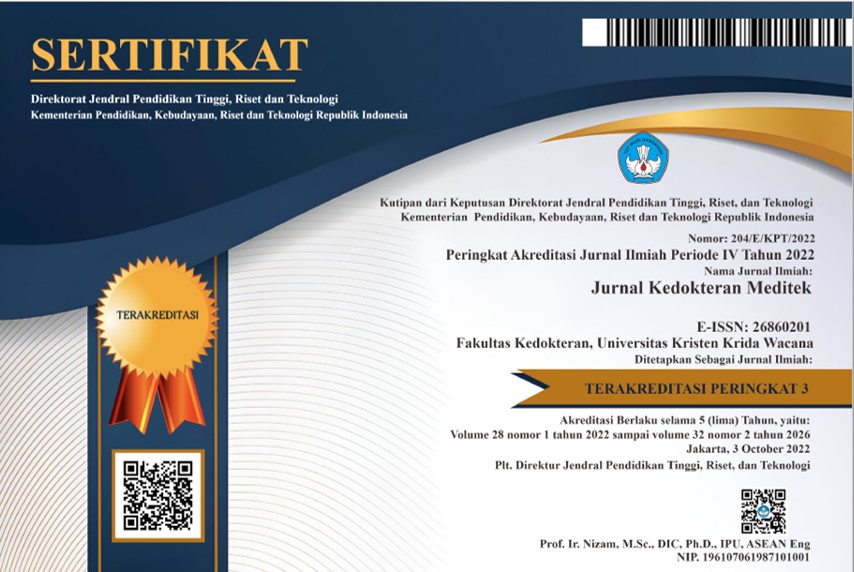Perbaikan Klinis Green Nail Syndrome yang Signifikan pada Lanjut Usia dengan Terapi Kombinasi: Sebuah Serial Kasus
DOI:
https://doi.org/10.36452/jkdoktmeditek.v31i2.3383Keywords:
acetic acid, ciprofloxacin, gentamicin, geriatric, green nail syndromeAbstract
Introduction: Green nail syndrome is a common bacterial infection of the nails and is characterized by green discolouration of the nail plate caused by Pseudomonas aeruginosa. It frequently occurs in people who are exposed to constant water and due to mechanical trauma, especially in elderly patients. Case Illustration: We reported 2 cases treated with a combination therapy of oral ciprofloxacin, 1% acetic acid dressing, gentamicin ointment and showed a significant clinical improvement. There are two cases: a 67-year-old man and a 64-year-old woman complained of black-greenish discolouration on his right big toenail, which has been accompanied by changes in the shape of the nail for 3 months. Both patients have a history of frequent and prolonged contact with water—dermoscopy results in greenish-black discolouration in the nail plate. The culture results of both patients, Pseudomonas aeruginosa was found. Combination treatment showed significant clinical improvement in both patients. Discussion: Dressing of 1% acetic acid was useful as an adjuvant to improve the ointment penetration, inhibiting the formation of Pseudomonas aeruginosa biofilms. Gentamicin and ciprofloxacin are effective against aerobic gram-negative bacterial infections, such as Pseudomonas aeruginosa. Conclusion: The use of ciprofloxacin is recommended, especially in elderly patients. Combination therapy with oral ciprofloxacin, 1% acetic acid dressing, and gentamicin ointment is an effective option for patients with green nail syndrome
References
Lee H, Mun JH, Cho S, Park H. Clinical analysis of Pseudomonas aeruginosa-positive and -negative green nail syndrome cases: A single center retrospective analysis. J Dermatol [Internet]. 2021 Jul;48(7):1073-1076. Available from: https://doi.org/10.1111/1346-8138.15832
Chiriac A, Brzezinski P, Foia L, Marincu I. Chloronychia: Green nail syndrome caused by Pseudomonas aeruginosa in elderly persons. Clin Interv Aging. Clin Interv Aging [Internet]. 2015 Jan 14;10:265-7. Available from: https://doi.org/10.2147/CIA.S75525
Mordorski B, Friedman AJ. Gram-negative coccal and bacillary infections. In: Kang S, Amagai M, Bruckner AL, Enk AH, Margolis DJ, McMichael AJ, et al., editors. Fitzpatrick’s dermatology. 9th ed. New York: McGraw Hill; 2019. p. 2789–96.
Corsello G, Vecchio D. Green nail syndrome. Pediatr Int [Internet]. 2014 Oct;56(5):801. Available from: https://doi.org/10.1111/ped.12462
Müller S, Ebnöther M, Itin P. Green nail syndrome (Pseudomonas aeruginosa nail infection): Two cases successfully treated with topical nadifloxacin, an acne medication. Case Rep Dermatol [Internet]. 2014 Jul 19;6(2):180-4. Available from: https://doi.org/10.1159/000365863
Ohn J, Yu DA, Park H, Cho S, Mun JH. Green nail syndrome: analysis of the association with onychomycosis. J Am Acad Dermatol [Internet]. 2020 Sep;83(3):940-942. Available from: https://doi.org/10.1016/j.jaad.2020.01.040
Ohn J, Hur K, Park H, Cho S, Mun JH. Dermoscopic patterns of green nail syndrome. J Eur Acad Dermatol Venereol [Internet]. 2021 Jul;35(7):e464-e466. Available from: https:// doi.org/10.1111/jdv.17224
Geizhals S, Lipner SR. Retrospective case series on risk factors, diagnosis and treatment of Pseudomonas aeruginosa nail infections. Am J Clin Dermatol [Internet]. 2020 Apr;21(2):297-302. Available from: https://doi.org/10.1007/s40257-019-00476-0
Bae Y, Lee GM, Sim JH, Lee S, Lee SY, Park YL. Green nail syndrome treated with the application of tobramycin eye drop. Ann Dermatol [Internet]. 2014 Aug;26(4):514-6. Available from: https://doi.org/10.5021/ad.2014.26.4.514
Chaves BJ, Tadi P. Gentamicin [Internet]. Treasure Island (FL): StatPearls Publishing; 2022 [cited 2024 June 2]. 10p. Available from: https://www.ncbi.nlm.nih.gov/books/NBK557550/
Yang YS, Ahn JJ, Shin MK, Lee MH. Fusarium solani onychomycosis of the thumbnail coinfected with Pseudomonas aeruginosa: Report of two cases. Mycoses [Internet]. 2011 Mar;54(2):168–71. Available from: https://doi.org/10.1111/j.1439-0507.2009.01788.x
Carhart P, Espinosa J, Lucerna A. A case of green nail syndrome diagnosed in the emergency department. Cureus [Internet]. 2024 Mar 27;16(3):e57032. Available from: https://doi.org/10.7759/cureus.57032
Tawre MS, Kamble EE, Kumkar SN, Mulani MS, Pardesi KR. Antibiofilm and antipersister activity of acetic acid against extensively drug-resistant Pseudomonas aeruginosa PAW1. PLoS One [Internet]. 2021;16(2):e0246020. Available from: https://doi.org/10.1371/journal.pone.0246020
Cadelis MM, Li SA, Bourguet-Kondracki ML, Blanchet M, Douafer H, Brunel JM, et al. Spermine derivatives of indole-3-carboxylic acid, indole-3-acetic acid and indole-3-acrylic acid as gram-negative antibiotic adjuvants. ChemMedChem [Internet]. 2021 Feb 4;16(3):513–23. Available from: https://doi.org/10.1002/cmdc.202000359
Kramer A, Dissemond J, Kim S, Willy C, Mayer D, Papke R, et al. Consensus on wound antisepsis: update 2018. Skin Pharmacol Physiol [Internet]. 2018;31(1):28–58. Available from: https://doi.org/10.1159/000481545
Yu Q, Wang Y, Yang H, Li W, Yang L. Case report: novel use of the conventional method—chemical nail avulsion may be effective for treatment of green nail syndrome. Front Med (Lausanne) [Internet]. 2022 Aug 25;9:991918. Available from: https://doi.org/10.3389/fmed.2022.991918
Hur K, Cho S. Chloronychia caused by Pseudomonas oryzihabitans infection. JAAD Case Rep [Internet]. 2020 Jul 31;6(9):918–20. Available from: https://doi.org/10.1016/j.jdcr.2020.07.040
Baran R, Richert B. Green nail: etiology and treatment of chloronychia. Hand Surg Rehabil [Internet]. 2024 Apr;43S:101653. Available from: https://doi.org/10.1016/j.hansur.2024.101653
Thai T, Salisbury BH, Zito PM. Ciprofloxacin [Internet]. Treasure Island (FL): StatPearls Publishing; 2023 [cited 2024 June 2]. 10p. Available from: https://www.ncbi.nlm.nih.gov/books/NBK535454/
Matsuura H, Senoo A, Saito M, Hamanaka Y. Green nail syndrome. QJM [Internet]. 2017 Sep;110(9):609. Available from: https://doi.org/10.1093/qjmed/hcx114
Downloads
Published
How to Cite
Issue
Section
License
Copyright (c) 2025 Reinanda Marizki Ramadhani, Shannaz Nadia Yusharyahya, Lili Legiawati, Rinadewi Astriningrum, Keiko Yolanda Gunardi, Reisa Reshinta

This work is licensed under a Creative Commons Attribution-ShareAlike 4.0 International License.

















